Russian Media Spin Putin-Macron Meeting
Selective quoting of Western media to create the image of success
Russian Media Spin Putin-Macron Meeting
Share this story
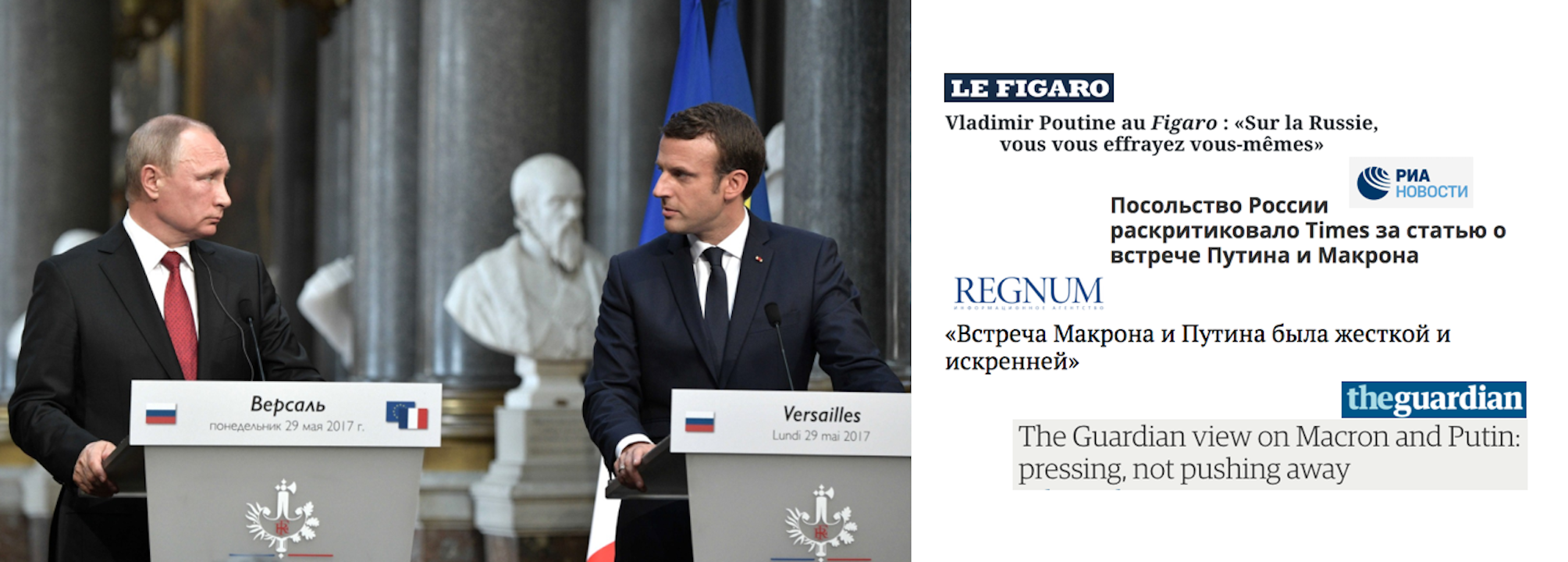
Less than a month after French presidential elections in which the Kremlin was accused of meddling, Russian President Vladimir Putin and French President Emanuel Macron met at the palace of Versailles on May 29.
The men did not meet as friends. Putin and the Kremlin’s propaganda machine opposed Macron throughout the election, backing his conservative rival Francois Fillon and nationalist challenger Marine Le Pen. Putin even welcomed Le Pen to the Kremlin a month before the poll.
Macron went into the meeting promising a tough line. According to Western media after the event, he largely delivered.
“Putin visits France for talks; Macron does not give an inch,” headlined the Associated Press, in a story picked up by the Washington Post and Boston Globe. “Emmanuel Macron challenges Putin on Syria and gay rights,” headlined the New York Times. “French President Emmanuel Macron just went after Russia — to Putin’s face,” headlined Vox.

The Russian media took a different view of the visit. By selectively quoting Western media reports, their coverage was significantly more positive toward Putin. The primary goal appears to have been to protect Putin domestically, as it would hardly reinforce his tough-guy image to be dominated by a man that some in the Russian media have labeled as gay. However, it could also signal a desire for rapprochement with Macron.
Russian coverage
The state-controlled media certainly lingered on the positive aspects of the visit. State TV outlet Rossiya 1, for example, chose to cover the meeting as grand, respectful, and friendly:
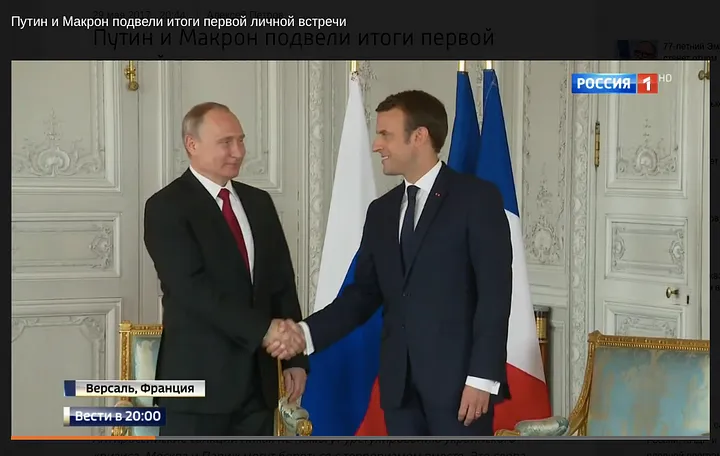
Every step is refined. The bearing is impeccable. In the sunshine of Versailles, it seems that the history itself is reflected. But while the motorcade of the Russian president is rushing from the Roissy-Charles de Gaulle airport, all the conversations on the sidelines are about the current state of bilateral relations.
Guard of honor. Red carpet. In a solemn ceremony, everything is ready. Vladimir Putin is the first foreign leader Emmanuel Macron welcomes to France.
The outlet continued its coverage by quoting Putin in a tone which emphasized common interests, especially business:
I am convinced that the fundamental interests of Russia and France are much more important than the current political conjuncture … French businesses, which continue to work actively in Russia, by the way, understand it best. Not one of the nearly 500 French companies has left the Russian market, despite all economic difficulties in recent years.
The tone of cordiality was reflected in many other Russian outlets. Vedomosti, for example, focused on the diplomatic protocol and degree of formality Putin was afforded, and also quoted him on French business interests; MK.RU ran a stand-alone story which quoted Putin as calling Macron a ‘pragmatic politician.’
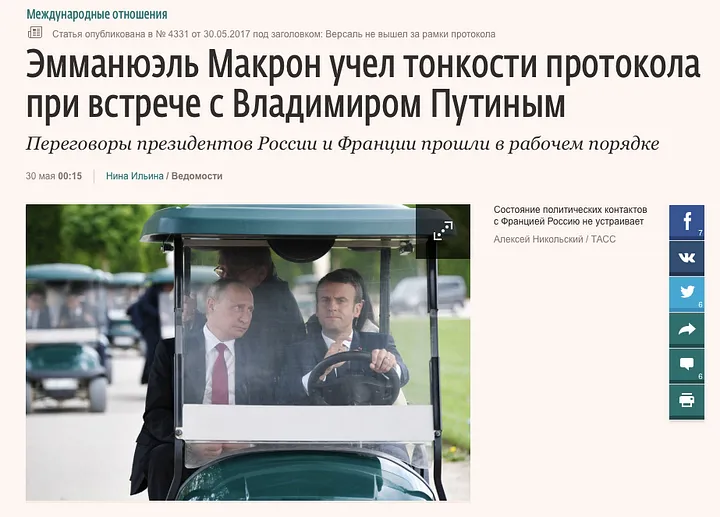
Lenta.ru and NTV emphasized only issues both leaders agreed to cooperate on. Lenta characterized Putin’s behavior in the press conference after the meeting as, “the Russian leader allowed Macron to go solo, and, apparently, allowed the young politican’s taunts to pass by.” (The article largely focused on an interview Putin gave to Le Figaro after the meeting.) NTV headlined that “Putin supported Macron’s opinion on a ‘red line’ in Syria.”
Even during a live broadcast on state-owned Rossiya-24’s show “60 Minutes,” the correspondent reporting from Versailles underlined what they saw as the respectful and friendly signals from Macron.
Perhaps most intriguingly, Ministry of Defense television station Zvezda put a positive light on the meeting by reporting Western media outlets treated it positively.
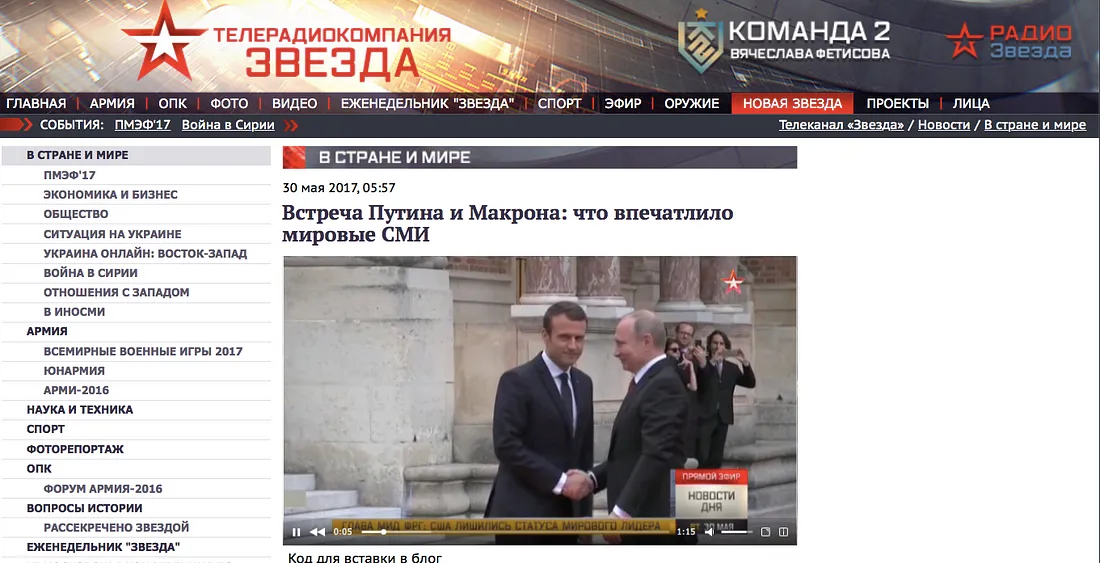
Zvezda quoted French daily Libération as saying that Putin’s arrival was “an example of solemnity, filled with all proper honors — the presence of Republican Guards and a whole company of drummers. And dozens of journalists awaited the first handshake with impatience.”
It quoted the Washington Post as saying that “those who expected fireworks were disappointed,” and underlined that, according to Le Figaro, the leaders’ handshake did not give the sense of rivalry experienced when Macron shared a white-knuckled grip with US President Donald Trump, adding, “The face-to-face talks were manly and friendly.” Zvezda provided links to the homepages of the outlets in question, but not the articles.
Enough detail was given to identify the articles, however. Zvezda’s treatment of them can best be described as accurate, but incomplete. The Libération article, for example, did indeed mention the solemn atmosphere, the drummers and the guards, but it was distinctly downbeat on the outcomes and on Putin’s contribution:
From the two presidents’ common address, it appears that many subjects were discussed, but few solutions were sketched out. Macron returned to the conflict in Ukraine several times, another, umpteenth meeting in the Normandy Format, preceded by a detailed OSCE report on the situation on the ground. Vladimir Putin did not have much to add. The French president did not evade the issue of the persecution of LGBTs in Chechnya and the situation of NGOs in Russia, underlining France’s position on these subjects. Vladimir Putin preferred not to comment…
Similarly, the Washington Post article did mention the lack of “fireworks” at the handshake, but added Macron “didn’t pull any punches” in his press conference. Zvezda’s portrayal of the Le Figaro article was even more selective; this is the original:
There was no battle between them, as was the case on Thursday in Brussels between Donald Trump and Emmanuel Macron, whose bodies had clashed in a manly way in their first face-to-face meeting. But the atmosphere, at the press conference, was glacial. Emmanuel Macron was at ease, authoritative, mastering his subjects perfectly, and above all, very sure of himself. Vladimir Putin seemed tense, his face closed and a rictus around his mouth. His speech seemed disembodied.
Internet agency Regnum also appeared to selectively quote a Western outlet — in this case, Spanish outlet El Confidencial. Regnum accurately quoted the Spanish publication as saying that the meeting was ‘tough and sincere’, and listed the various points of disagreement, but it left out the comment which El Confidencial itself headlined: Macron’s threat to respond if chemical weapons are used in Syria again.
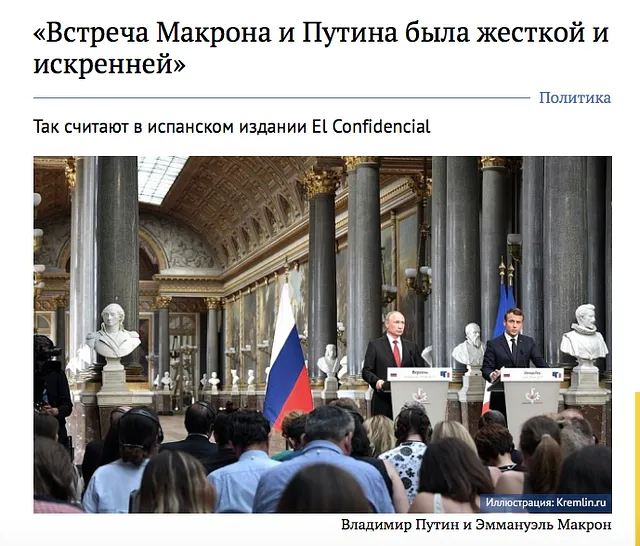
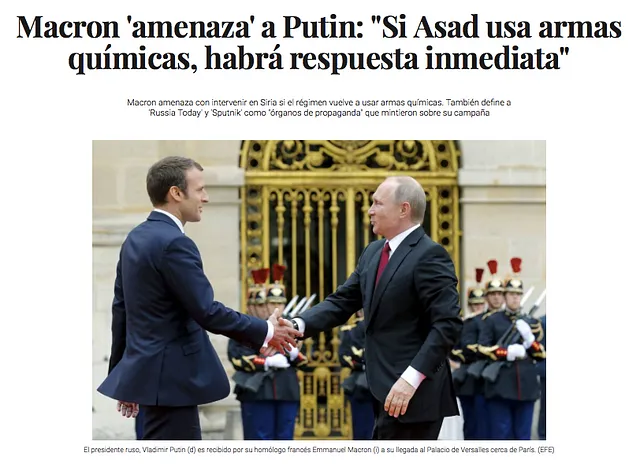
El Confidencial dealt with the issue at some length:
The Kremlin’s objective in the first visit of a foreign head of state to the new French president was none other than to repair the damaged relationship. It did not start well. Macron threatened to intervene militarily in Syria if the regime of Bashar al-Assad, whose principal ally is Russia, uses chemical weapons again.
Regnum, in a piece devoted to the El Confidencial report, did not.
The propaganda question
The most glaring difference in coverage concerned Macron’s claim that Kremlin outlets RT and Sputnik were “spreading false information” about him and “acted as influencers, propaganda tools, and lying propaganda.”
The comment made headlines across the Western media, where RT and Sputnik have regularly (and accurately) been accused of acting as Kremlin propaganda outlets.
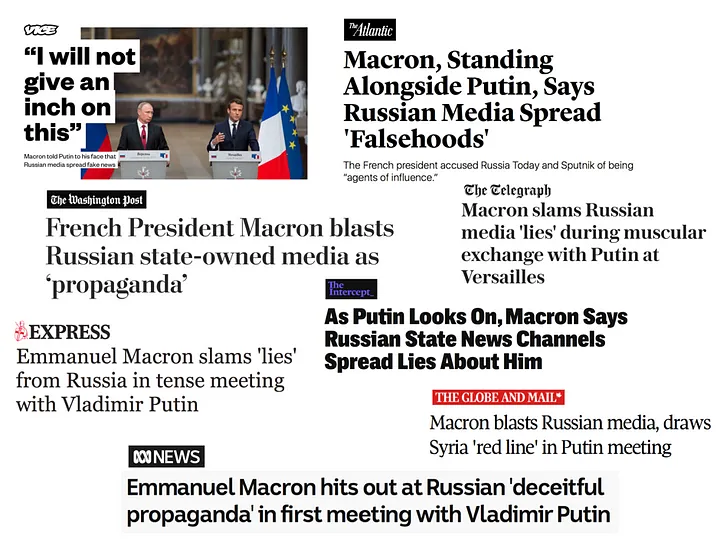
Ironically, the storm was triggered by an RT France employee, Kseniya Fodorova, who asked during the press conference:
…And, if it’s possible, to continue my colleague’s topic about the election campaign in France. Russian journalists had particular difficulties to access your election office. Can you comment, how are you planning to develop relations with foreign journalists?
Macron answered:
I can have outstanding relations with foreign journalists, if they are journalists. Politicians have responsibility to say the truth. If someone is spreading lies they are not journalists. Russia Today and Sputnik were spreading false information, lies, and I think they didn’t have rights to be at my pre-election campaign office. (…) Russia Today and Sputnik didn’t act as press and as journalists, they acted as influencers, propaganda tools, and lying propaganda, no more, no less.
Putin remained poker-faced while Macron spoke and did not comment on the allegation, either in the press conference or in a subsequent interview with Le Figaro. Although, in the latter he was asked about allegations of Russian interference in the US and French elections.

The response was left to Russian Foreign Minister Sergey Lavrov, whose comment was shared on some Russian media (Gazeta.ru, NTV) and the Sputnik and RT international networks:
I think that here, in these assessments, the well-known inertia of the anti-Russian campaign which the Obama administration unleashed and which has captured a number of other countries, including in Europe, was reflected. (…) I repeat that the most important thing in all of these accusations is in the most diverse areas — we do not see a single concrete fact.”
RT and Sputnik also responded vociferously. Sputnik France published an official reply by editor-in-chef Margarita Simonyan, who is also RT’s chief editor. A day later it was also published in English. Both Sputnik and RT produced a compilation of tweets accusing Macron of hypocrisy, based on the fact that Libération had urged people to vote for Macron. The fact that Libération, unlike RT and Sputnik, is privately run, was left aside.
Finally, both Sputnik and RT reported Lavrov’s comment about Macron’s confrontational reply. RT published it at least on its French, Russian, Spanish. Sputnik published it on its French, English, Brazilian versions.
However, few other Russian outlets covered the claim; notably, the main report on Vesti news, a compilation almost seven minutes long, failed to mention it ar all. The issue was addressed by Gazeta.ru and MK.RU, but the majority of outlets either ignored it or relegated it to a minor mention. The Russian Embassy in the UK, a noted source of online trolling, even attacked the Times in a tweet for ‘dramatizing’ the subject:
It was explicitly stated that no "Russian meddling in western politics" was discussed. Stop dramatizing, @thetimes pic.twitter.com/lqe3EvQHUw
— Russian Embassy, UK (@RussianEmbassy) May 30, 2017
Sputnik’s sister agency, RIA Novosti, published an article on the tweet, with the ominous URL ria.ru/mediawars.
Conclusion
The Russian-language media coverage of the Putin-Macron meeting was noteworthy for its emphasis of the positives and its avoidance of the negatives. This included highly selective reporting of comments published by Western news outlets, apparently designed to create the impression that the meeting was seen as a success for Putin in countries other than Russia.
The primary reason for this distortion is likely domestic. Putin has cultivated a strong-man image for years; to portray the meeting as a clash of wills won by Macron — as the Western media very largely did — would be simply incompatible with that image.
The portrayal of the meeting as a success could also serve to counter the domestic perception that Russia is still isolated internationally because of its illegal annexation of Crimea and its sponsorship of the war in Ukraine. A president who is welcomed in a “manly and friendly” meeting is harder to portray as a pariah.
The Russian media have, of course, long been known for their subservience to the Kremlin’s narratives; as such, their selective reporting is not a surprise. Nonetheless, it suggests a sense of vulnerability within the Russian government. Putin did not emerge from the Versailles meeting as a dominant figure, at least in the eyes of Western media; the main practical outcome of the meeting appears to have been that it took place. Presenting the meeting as more than it was, and misrepresenting the Western media to do so, gives the impression of a communications machine which is keenly aware of the need for positive headlines — and the lack of them.

